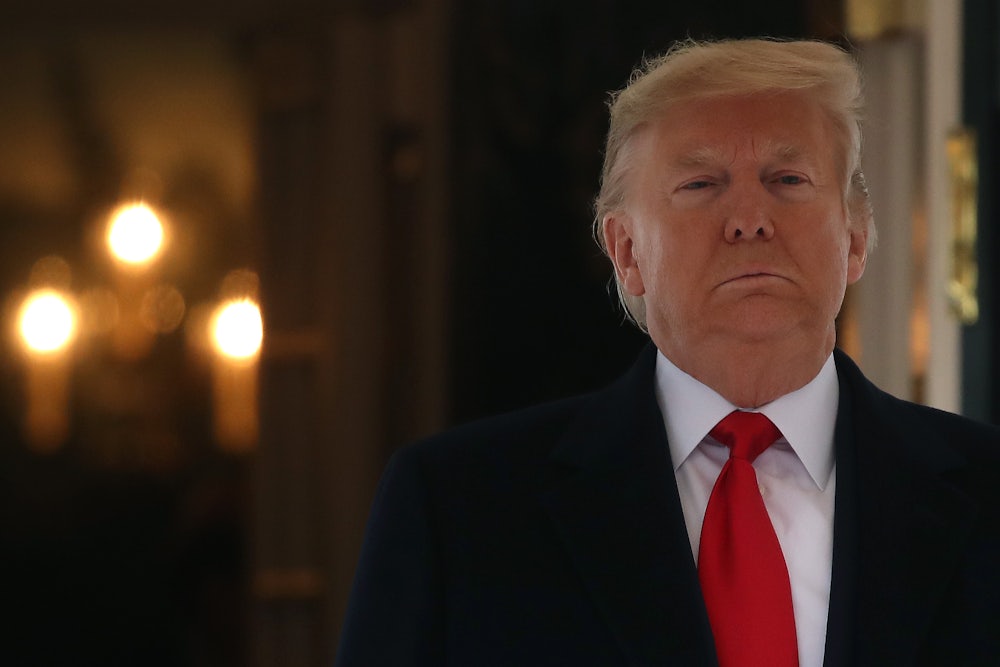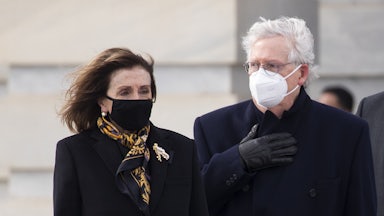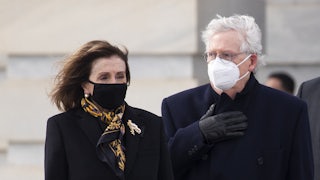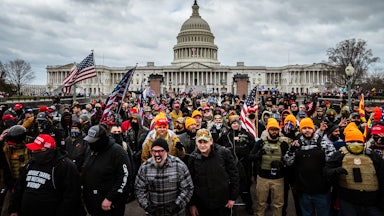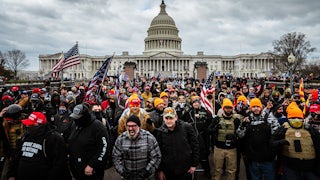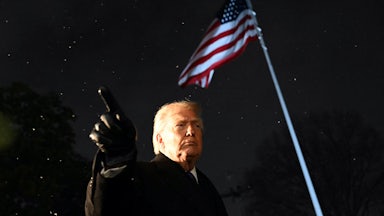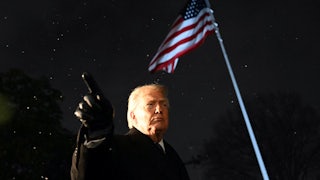Donald Trump has once again wriggled his way out of his latest jam. Fifty-seven senators voted on Saturday to find the former president guilty of inciting the January 6 attack on Capitol Hill, including seven Republicans who made an unprecedented break from the ranks of their party. But the Senate fell far short of the 67 guilty votes needed to convict Trump. He now has the dubious honor of being the first president to be acquitted twice in a Senate impeachment trial.
This isn’t all that surprising. Trump’s one real skill in life is escaping accountability. He emerged unscathed from the Ukraine scandal and the impeachment that followed by demanding unflinching loyalty from Republican lawmakers. He managed to pardon and obstruct his way out of the Russia investigation. He lives in gold-plated apartments while paying less income tax than most of the people who voted for him. And in a reckless bid to avoid the first consequence of his life—losing a presidential election—he put the lives of lawmakers at risk, egging his supporters on in a violent riot.
But even as he embraces the retiree lifestyle at one of his Florida resorts, the former president faces a small army of legal problems. His presidential status gave him a certain amount of de facto immunity; prosecutors in New York even told the Supreme Court they wouldn’t indict him as long as he remained in the White House. But that shield is gone now, and in its place is a range of investigations and lawsuits that could force him to do what was once unthinkable: face some sort of consequences for his actions.
On Tuesday, Mississippi Representative Bennie Thompson filed a lawsuit against Trump and his lawyer Rudy Giuliani, as well as the Proud Boys and the Oath Keepers, for their role in the Capitol riots. The complaint alleges that Trump, Giuliani, and the two groups “conspired to incite an assembled crowd to march upon and enter the Capitol” to disrupt the Electoral College count on January 6. Thompson’s lawsuit is the first civil litigation brought by anyone inside the Capitol during the attack against Trump, his allies, or the rioters, for their role in it.
Whether the lawsuit will succeed is unclear. Presidents generally can’t be sued in their personal capacity for actions they take while in office. Thompson brought the lawsuit under a rarely invoked provision of the Enforcement Acts, which are also known as the Ku Klux Klan Acts for their role in smashing the first Klan during Reconstruction in the early 1870s. The provision allows litigants to file complaints against any two persons who “conspire to prevent, by force, intimidation, or threat” any federal official “so as to molest, interrupt, hinder, or impede him in the discharge of his official duties.”
Trump faces scrutiny from other angles for his role in January 6. CNN reported earlier this week that Trump himself is concerned about the possibility of criminal charges, which has played a role in his unusually subdued public profile since leaving office last month. Even some high-ranking Republicans, such as Senate Minority Leader Mitch McConnell, have argued that the former president is personally and directly responsible for the unrest in Washington that day. The Senate’s acquittal vote over the weekend wouldn’t count for double jeopardy if federal prosecutors later decide to bring charges against him. D.C. Attorney General Karl Racine is reportedly mulling charges against Trump for his actions.
How likely is it that those charges would stick? During the impeachment trial, Trump’s lawyers argued that the First Amendment protected Trump from conviction by the Senate for inciting an insurrection. Most legal scholars found that claim preposterous, with some noting that it would prevent the Senate from convicting a hypothetical president who publicly renounced his oath of office. But the First Amendment would apply in any criminal proceeding against Trump for the riots, and the existing precedents may make such a case difficult to build.
Ironically, Trump’s best defense would come from the Ku Klux Klan. In the 1969 case Brandenburg v. Ohio, the Supreme Court overturned the conviction of a Klan leader who had been prosecuted for urging violence against Black and Jewish communities. The justices held that defendants could not prosecute calls for violence unless “such advocacy is directed to inciting or producing imminent lawless action and is likely to incite or produce such action.” To a court of history, Trump’s role in the attack on the Capitol is painfully clear. But a court of law may still find that his heated rhetoric falls short of the “imminent lawless action” standard.
January 6 isn’t the only sword of Damocles hanging over Trump’s head, however. Manhattan District Attorney Cy Vance Jr. has spent the last few years investigating the Trump Organization for possible wrongdoing, including tax fraud and similar charges. The Wall Street Journal reported on Tuesday that Vance’s office had recently expanded its investigation to cover some of Trump’s Manhattan real estate holdings, as well as some of the loans obtained to finance them. In 2019, former Trump lawyer Michael Cohen told Congress that Trump had raised and lowered the values of his properties to obtain more favorable outcomes for tax assessments and bank loans.
The secretive nature of criminal investigations makes it hard to gauge the full extent of Trump’s legal exposure. There are signs, for example, that Trump is also under investigation by the local prosecutor’s office in Fulton County, Georgia, for his interactions with state election officials over the past few months. Trump infamously pressured Georgia Secretary of State Brad Raffensperger, a Republican, to overturn President Joe Biden’s victory in the state and award him the state’s electoral votes. “I just want to find 11,780 votes, which is one more than we have,” Trump told Raffensperger in a lengthy phone call where he also implicitly threatened Raffensperger’s political future and floated potential criminal charges against him. It’s generally illegal to coerce or intimidate election officials.
And then there’s the possibility of federal charges. Trump decided against issuing himself a pardon before leaving office, apparently persuaded that such a brazen move would make the Biden Justice Department more likely, not less likely, to charge him with a criminal offense if the evidence supports it. Whether federal prosecutors will ultimately bring charges against Trump for any offense will likely be decided by Merrick Garland, Biden’s nominee for attorney general. The former president faces legal peril on multiple fronts, whether for using his business empire as a vehicle for self-enrichment while in office or for years of dubious accounting schemes to lower his tax burden.
If a case can be made against him, I argued in our December issue, it would be a mistake for the feds to not bring it in the interest of moving on or looking forward. Ultimately, that Trump faces multiple avenues of potential legal exposure does not guarantee that he will ever actually be held accountable for his wrongdoing. He has slipped the clutches of responsibility all his life, and it’s entirely possible that he always will. But the pursuit of justice is a just end in itself. And perhaps Trump’s punishment shall be spending the rest of his days not as a former president but as a semi-professional defendant.
